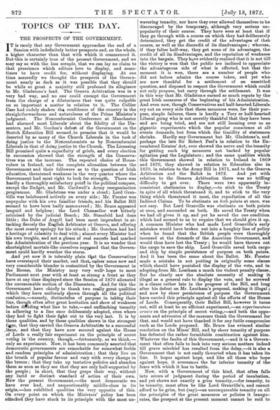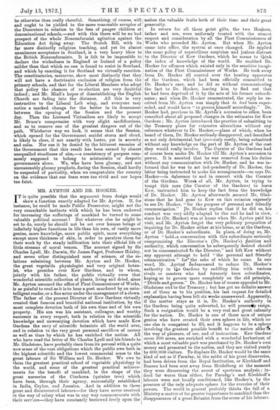TOPICS OF TEE DAY.
THE PROSPECTS OF THE GOVERNMENT.
iT is rarely that any Government approaches the end of a Session with indefinitely better prospects and, on the whole, a higher character than that with which it commenced it. But-this is certainly true of the present Government, and we may say so with the less scruple, that we can lay no claim to that prescience which editors love to display, and some- times to have credit for, without displaying. At one time assuredly we thought the prospects of the Govern- ment nearly as dark as • it was possible that they should be while so great a majority still professed its allegiance to Mr. Gladstone's lead. The Geneva Arbitration was in a very bad way, and no one could exempt the Government from the charge of a dilatoriness that was quite culpable on so important a matter in relation to it. The Collier Case had rudely shaken tha confidence of the country in the straightforwardness and naturalness of the Prime Minister's judgment. The Nonconformist Conference at Manchester had alarmed most Liberals- about the fidelity of the Dis- senters, and Mr. Gordon's defeat of the Government on the Scotch Education Bill seemed.to promise that it would be deserted by. as many of the Church Liberals in the task of doing justice to the Nonconformists as by Nonconformist Liberals in that of doing justice to the Church. The Licensing Bill promised quite a superfluity of griefs, and every election in succession showed that the strength of the Conserva- tives was on the increase. The repeated choice of Home- rulers in Ireland, and the complete alienation between the Government and their followers as to the. question of Mali education, threatened weakness in the very quarter where the Government had most right to look for strength. There was hardly a thoroughly satisfactory point in the political compass, except the Budget, and Mr. Cardwell's Army reorganisation . programme. Mr. Gladstone was under a cloud ; Lord Gran- ville was belaboared actively on every side ; Mr. Forster was unpopular with his own familiar friends, and his Ballot Bill seemed to have been badly manceuvred ; Mr. Brace appeared languid and helpless ; the Lord Chaneellor wet bitterly
* criticised by the judicial Bench ; Mr. Stansfeld had done little the Duke of Argyll had been most inipradent in at- tacking fiercely the English Arbitrator at Geneva, and offering the most scanty apology for his attack ; Mr. Goschen had had a heritage of calamity fo deal with ; almost every Minister had his own trouble, and not a gleam of real succeas had marked the Administration of the previous year. It is no wonder that shortsighted mortals-like ourselves supppsed that the Govern- ment could hardly weather the storm.
And yet- now it is tolerably plain that the Conservatives have overstayed their market, and that uoless some new and very considerable blunder is collimated by the Gevernment in the Recess, the Ministry may very well- hope to meet Parliament next year with at least as strong a front as they have at any time displayed since the Session of 1870 alienated the unreasonable section of the Dissenters, And for this the Government have chiefly to thank two really great qualities which they have uniformly shown through all the political confusion,—namely, distinctness of purpose in taking their line, though often after great hesitation and show of weakness before dffliding what line to take,—and unflinching tenacity in adhering to a line once deliberately adopted, even where they had to fight their fight- out to the very last. It is by these qualities, and by these qualities shown in the strongest fuTp3, that they carried the.Geneva Arbitratinn to a successful „ilium, and that they have now secured against the House of Lords a really fair experiment on the principle of secret voting in the country, though,—foltunately, as we think,— only an experiment. Now, it has been commonly asserted that democratic governments are remarkable for somewhat feeble and random principles of administration ; that they live on the breath of popular favour and vary with every change in the breeze ; that they take up tentative policies and abandon them as soon as they see that they are only half-supported by the people ; in short, that they grope their way, without any lucid or distinet standard of action of their own. Now the present Government,—the most democratic we have ever had, and unquestionably middle-class in its origin,—has exhibited qualities the very opposite of this. On every point on which the Ministers' policy has been attacked they have stuck to its principle with the most un-
wavering tenacity, nor have they ever allowed themselves to be discouraged by the temporary, although very serious un- popularity of their course. They have seen at least that if they go through with a course on which they had deliberately determined, they get the credit of the advantages of that course, as well as the discredit of its disadvantages ; whereas, if they falter half-way, they get none of its advantages, the. credit of all its disadvantages, and the reputation of weakness into the bargain. They htive evidently realised that it is not tillt the victory is won that the public are inclined to appreciate- the advantageous side of what is effected, but that the- moment it is won, there are a number of people who. did not before admire the course taken, and yet who- are now thankful for a settlement of an unsettleb question, and disposed to respect the Government which could not only propose, but carry through the settlement. It wa& in this way that Mr. Gladstone earned so much repute by the. great Irish measures of the beginning of his Administration... And even now, though Conservatives and half-hearted Liberals cry out on every side that these measures were, for their pur- pose, simple failures, there is hardly a Tory or half-hearted Liberal going who is not secretly thankful that they have been and are being tried, and are not still looming over us as- gigantic experiments which the popular conscience at all events demands, but from which the timidity of statesmen. shrinks. Hardly any Government but Mr. Gladstone's, and perhaps the late Sir Robert Peel's in relation to the En-- cumbered Estates' Act, ever showed the nerve and the tenacity- for getting such big measures not backed by popular agitation past the Legislature ; and the same qualities which this Government showed in relation to Ireland in 186.9b and 1870, they showed in relation to Education also in 1870, in relation to the Army Bill in 1871, and to the Geneva, Arbitration and the Ballot in 1872. And yet with relation to the Geneva Arbitration there was no trifling
difficulty to get over. There were two apparently in-- consistent obstinacies to display,—to stick to the Treaty in spite of all which threatened it, and to stick to the very- thing which threatened it most, the repudiation of all the. Indirect Claims. To be obstinate on both points at once, was. not easy. But Lord Granville was obstinate on both points. atonce, and succeeded on both. He saved the Treaty when we had all given it up, and yet he saved the one condition which had seemed to us to require that we should give it up.. A common Minister who had made Lord Granville's early mistakes would have broken out into a haughty line of policy when he found that the British people were thoroughly incensed at the demands of the American Government, and would thus have lost the Treaty ; he would have thrown out the cargo to save the ship. Lord Granville saved both cargo, and ship by simple persistence of purpose on both points. And it has been the same about the Ballot. Mr. Forster made a mistake in not putting in originally some clause, which should have punished the display of the vote, and in adopting from Mr. Leatham a much too violent penalty clause.. But he clearly saw the absolute necessity of making it illegal as a general rule to display the vote, and he screwed in a clause rather late in the progress of the Bill, and long- after his defeat on Mr. Leatham's proposal, making it illegal ;. and now by sheer persistence of purpose the Government have carried this principle against all the efforts of the House- of Lords. Consequently, their Ballot Bill, however it turns- out, will at least be an efficient experiment,—an experimentuna erucis on the principle of secret voting,—and both the oppo- nents and advocates of the measure thank the Government for that, and would not have thanked it for any futile compromise- such as the Lords proposed. Mr. Brace has evinced similar- resolution on the Mines' Bill, and by sheer tenacity of purpose has defeated the rather formidable combination against him. Whatever the faults of this Government,—and it is a Govern- ment that often fails to look into very serious matters indeed till grave mischief has resulted from the delay,—it is also a Government that is not easily thwarted when it has taken its line. It hopes against hope, and like all those who hope against hope, it overcomes the far inferior tenacity of the, fears with which it has to battle.
Now, with a Government of this kind, that often falls- into errors of judgment daring the period of incubation, and yet shows not exactly a grim tenacity,—for tenacity, to be tenacity, must often be like Lord Granville's, and cannot afford to be grim, but (say)—an unconquerable tenacity on all the principles of the great measures or policies it inaugu- rates, the prospect at the present moment cannot be said to
be otherwise than really cheerful. Something, of course, will and ought to be yielded to the more reasonable scruples of the Dissenters in relation to the fees of pauper children at denominational schools,—and with this there will be no bad prospect of the whole Nonconformist agitation against the Education Act dying away. The Scotch Bill, with its far more distinctly religious teaching, and yet its almost unanimous acceptance in Scotland, is a very heavy blow to the British Nonconformists. It is felt to be impossible to declare the wickedness in England or Ireland of a policy -milder than that which no one is found to resist in Scotland, and which by enacting it for Scotland we virtually sanction. The constituencies, moreover, show most distinctly that they will not have a doctrinaire exclusion of religion from the primary schools, and that for the Liberal Members who adopt that policy the chances of re-election are very doubtful indeed ; and Mr. Miall's hopes of disestablishing the English Church are fading into the distance. All this is very instructive to the Liberal Left wing, and everyone may notice a marked change for the better in its demeanour between the- opening of the Session and the present day. Then the Licensed Victuallers are likely to accept Mr. Bruce's compromise with very slight modifications, and so to remove one of the greatest dangers out of the path. Whichever way we look, it seems that the Session, which opened for the Government amidst storm and cloud, is likely to close, if not exactly-with. lustre, yet in serenity and calm. Nor can it be denied by the bitterest enemies of the Government that this result has been earned by almost unequalled steadiness of aim,—a consistency of kurpose com- monly supposed to belong to aristocratic or despotic governments alone. We, who have been gloomy, and not unreasonably gloomy prophets, during the Session, shall hardly be suspected of partiality, when we congratulate the country on the evidence that our fears were too vivid -and our hopes too faint.



































 Previous page
Previous page